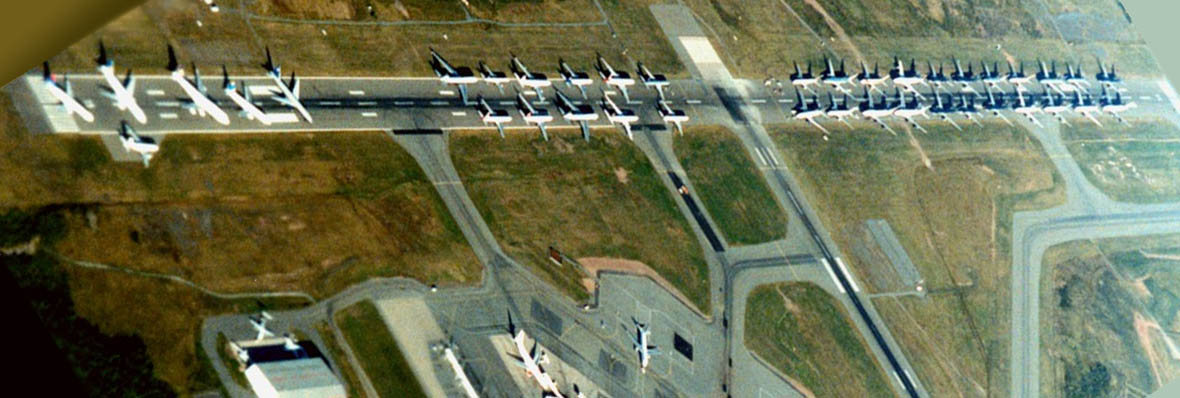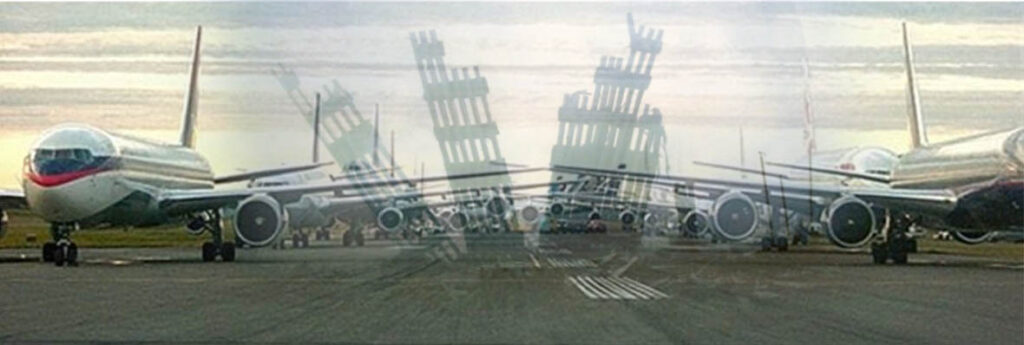“I saw the flight attendants in the galley crying. Then the pilot came on the intercom and said, ‘New York and Washington are under attack. All hell has broken loose, we’re going to Canada’.”
This is how a passenger on a Continental flight from London to New York said she learned about the 9/11 attacks on the World Trade Center and Pentagon.
Two hours later this flight landed at Halifax Stanfield International Airport (YHZ) and was immediately surrounded by armed police with dogs. For the next nine-to-14 hours passengers sat cut off from the world on the runway at a place they didn’t know. In that pre-digital, pre-social-media era diverted travellers were unable to access news or reach family and friends.
When North American airspace suddenly closed, 17 airports across Canada became the fallback destination for 255 US-bound flights and their 44,000 passengers and crew. That time of day is when most European flights are approaching North American airspace. The flights closest to North America landed at Halifax, Gander and St. John’s. Other airports, like Sydney, which has a shorter runway, were the go-to destination for domestic flights. Halifax received 42 aircraft, carrying over 8,400 passengers and crew.
The flights arrived in quick order. YHZ’s long-time Customer Relations Manager Kelly Martin told me their first job was developing a plan for parking this many aircraft. All of their emergency planning never anticipated so many arrivals. Once parked they had to figure out security and services for the aircraft and passengers and animals which were in the luggage holds.
Early in the evening of September 11th, my then 77-year-old mother, who was a long-time Red Cross volunteer received a call asking for help with Operation Grounded. I was skeptical about what anyone in the comfort and safety of our rural Nova Scotia valley could do with events unfolding in other time zones, but joined her to make sure she didn’t kill herself volunteering. That evening, we were part of a six-person Valley team crammed into a red van which drove across Nova Scotia from our hometown near the Bay of Fundy to the Red Cross Citadel in downtown Halifax. The building was pandemonium. The hallways were filled with people and boxes of personal care items ready to rush and be rushed to wherever needed. Every desk seemed encircled by people, like dozens of mini-command centres. It was movement and voices and ringing telephones and hands waiving papers at whoever would snatch it and run. I imagined this was what the 1929 stock market crash looked like.
Shortly after our arrival our group was assigned to open the Dartmouth High School as a reception centre for passengers on an Alitalia 747.
We drove through the empty streets of Halifax, across the MacDonald Bridge spanning Halifax Harbour and to the school in a fraction of the normal drive time. A truck from the military was already there, unloading cots and converting the gymnasium into a quasi-dormitory. A team from the phone company were on ladders inside, installing a phone bank so passengers, when they arrived, could call anywhere in the world for free. Caterers delivered hot, cold and kosher foods. DHS students opened up the computer lab and, working with custodians, dragged and pushed big screen TVs into the cafeteria so when diverted passengers arrived they could see what had happened.
Before any of the passengers arrived, city and suburban residents began showing up demanding to take home stranded passengers. The passengers weren’t yet here, but Nova Scotians were ready. They told us they cleaned their guest rooms, pulled rec room sofa beds open, and/or sent the kids to stay with neighbours or grandparents so they had room for these strangers. Everyone felt it was important that these uninvited guests knew they had a friend.
At this point we had had about 13 hours of repeatedly watching planes fly into the Twin Towers and seeing crowds of New Yorkers running screaming through the streets.
When the diverted passengers arrived our first task was to process them. We had half a dozen tables lined up on the gym’s stage. Passengers filed on stage, not to receive a graduation certificate, but to provide the International Red Cross with basic information: name, address, nationality, any medical conditions, travel details and permission to share with anyone searching for them. Somewhere, some group compiled this information so frantic family, friends and colleagues around the world could learn the fate of their loved ones.
Many of these passengers because of the news blackout while on the aircraft and language issue had little-to-no information about why they were in Halifax, wherever that was, and not New York. I can remember some of the volunteers trying to bridge the communication gap by a type of hand-puppetry mimicking aircraft crashing into buildings. I don’t know if the bewilderment on faces was for the poor acting or the actual events.
In the cafeteria I saw one 50-something New Yorker tightly gripping her sides as she rocked back and forth, staring at the TV. She couldn’t stop watching the planes fly into the towers. Eventually we learned she lived five blocks from the Twin Towers and what was on television was basically the view from her living room window. She was so traumatized by these images she couldn’t be alone. We discretely arranged for another woman to accompany her to the washroom and stay at her side through the night.
Members of the clergy – ministers, priests, a rabbi – also came by, walking the walk of the basic tenant of all faiths, ‘do unto others …’
Just before dawn our group of volunteers handed over the school and visitors to another Red Cross team and returned to our homes in the Annapolis Valley. We arrived home at 6:30 am. At 8:30 am, with flights still grounded we were asked to go to Camp Aldershot, a militia base outside Kentville, which had been an important training camp for WWI & II and was now pressed into service as a reception centre for 1,500 diverted travellers.
At Aldershot, like most host venues, medical teams were on-site, to check passengers who were not feeling well. Those who didn’t have their meds were provided with free prescriptions. Some were transferred to hospital for more detailed diagnostic tests and treatment, and their doctors informed.
Volunteers came to the camp offering tours of the area. Local women delivered food, offered laundry services and took people shopping. I overheard one young woman telling a new-found friend among her fellow passengers, “This woman, a complete stranger, took me shopping for underwear!” “Nooooo!” said her suddenly jealous friend. “YES! Can you imagine some stranger at home taking you shopping for panties!?!” “You are so lucky.”
One who wasn’t so lucky was the young mother who suffered a miscarriage due to the stress.
It was only when I saw Michael Moore’s movie, Fahrenheit 9/11, I learned people were told not to remove anything larger than a purse from an aircraft. On the ground at the time, volunteers didn’t know this. We didn’t know that the slow de-planning (up to 14 hours) was because all flight manifests were being checked for more terrorists, and luggage, cargo and aircraft were searched for weapons and bombs. Consequently, we had thousands of people without basics like toothbrush, toothpaste and comb. That said, the evening before I was astonished by one of the Alitalia passengers who had somehow managed to bring all of her luggage with her. She sat crying by the steps to the gymnasium stage, surrounded by every size and model of luggage Louis Vuitton made.
In response to these personal needs CFB Greenwood, the main air force base in Eastern Canada and 20-minute drive away, sent truckloads of towels and linens to Aldershot. Stores, like Sobeys, Lawton’s Drugs, Zellers, donated personal care items. My role was that of a quartermaster, doling out toothbrushes, towels, combs, soap, shampoo and condition. Sometimes I had to be harsh and explain if you got shampoo you couldn’t have conditioner, that needed to go to someone without shampoo. Early on it was a challenge for some people to accept leaving the shampoo and conditioner in shower stalls so others could share them.
What at first seemed like an abhorrent sharing scheme to some quickly caught on. 9/11 taught me there is a weird practically to disaster. People have greater patience and empathy if they can shower and brush their teeth.
One of the more amusing incidents at Aldershot was the woman who told me she woke up that first night to find a man crawling across the floor of her room. He immediately identified himself as a soldier, apologized for startling her and explained since she was given his bed he just wanted his wallet from the nightstand.
On the second and third days when the stress and forced sharing of items like shampoo and conditioner got to a couple of people an American businessman on a one-day London-to-New York business trip said, “You should put up a sign asking for donations. Let them know you’re volunteers, that this is donated stuff. They think the airlines or government are paying for this. They’re not used to kindness of this scale.” Whether they were used to this level of kindness it was there in abundance.
In a way, it was like a delayed returning of the favour for the way Boston came to Nova Scotia’s aid after the 1917 Halifax Explosion. Being able to do something for these traumatized passengers was a way of coping with the sense of helpless I/we got from watching the news coverage.


